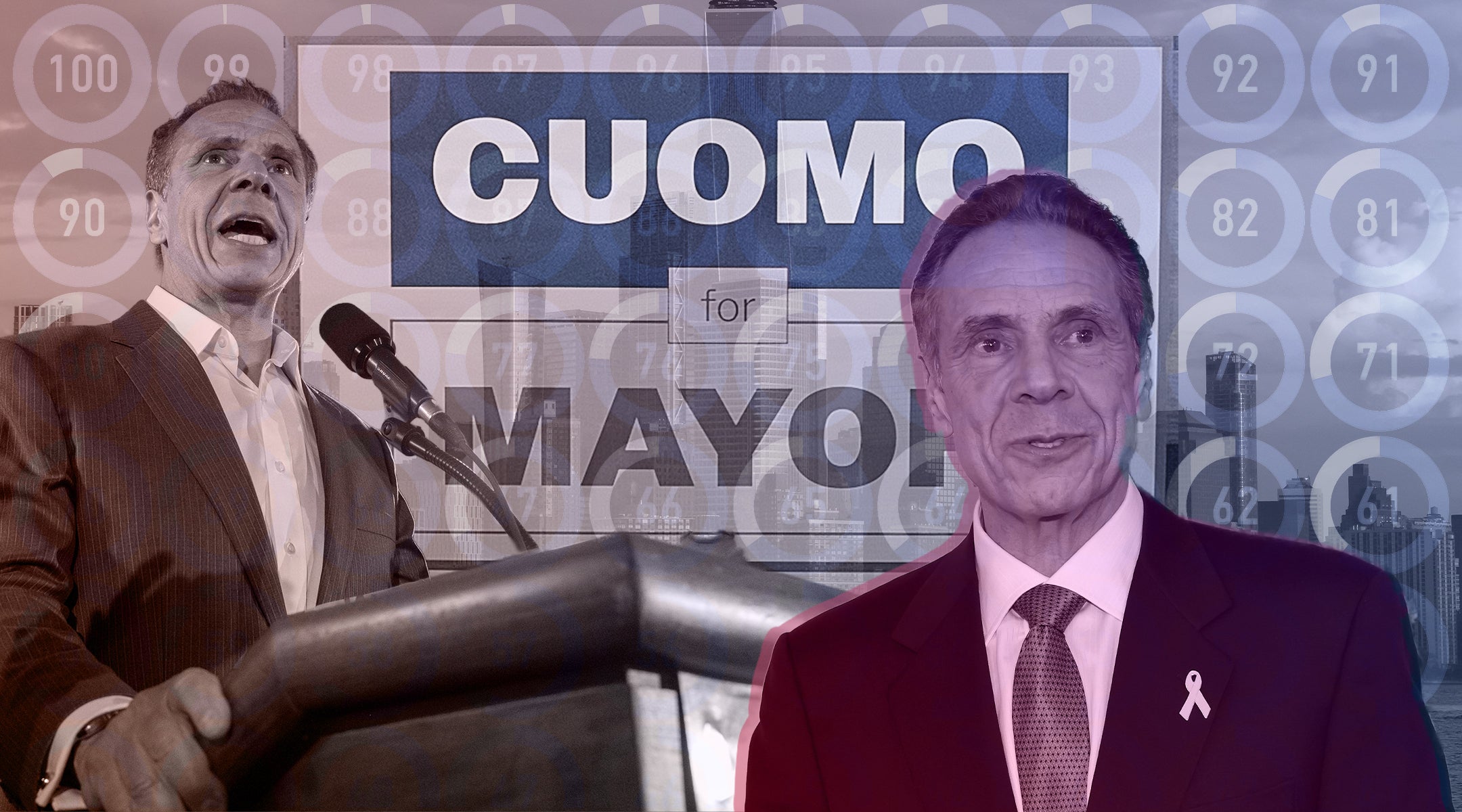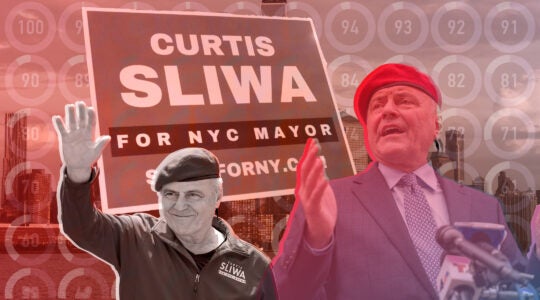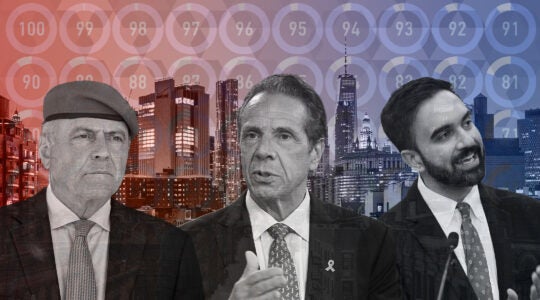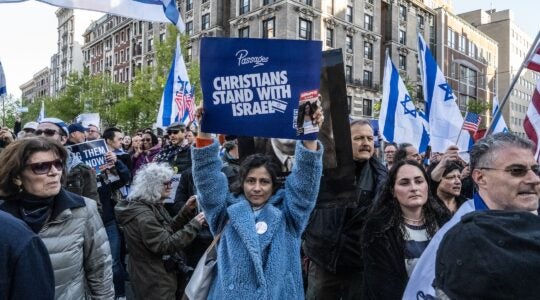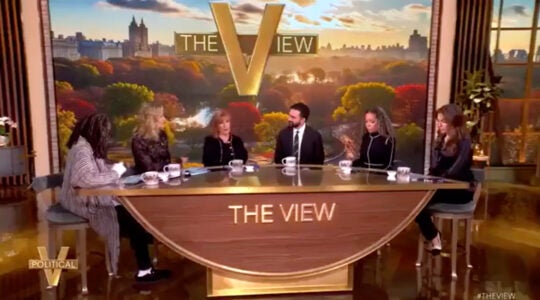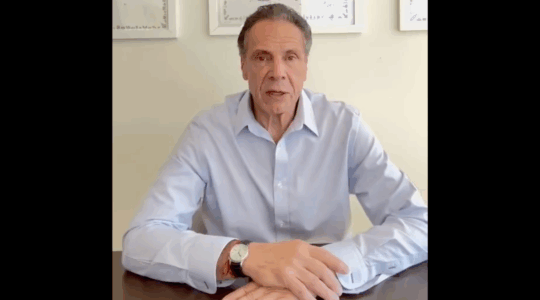At an Upper West Side synagogue in April, Andrew Cuomo pronounced “the most important issue” in his campaign for mayor of New York City: antisemitism.
The former governor has centered an appeal to Jewish New Yorkers as he seeks to defeat the race’s frontrunner, Assemblyman Zohran Mamdani, a staunch critic of Israel. In the same speech at the West Side Institutional Synagogue, Cuomo declared a belief that has defined his attitude toward Israel and antisemitism for decades.
“It’s very simple,” he said. “Anti-Zionism is antisemitism.”
Cuomo proceeded to lose the Democratic primary to Mamdani and relaunch his campaign as an independent in the general election. Now polling second but far behind Mamdani, he contends that his vow to defend Jews lies at the heart of his bid to lead the city with the largest Jewish population in the world. He himself has two Jewish brother-in-laws and a Jewish son-in-law who joined his family last year.
Here is a breakdown of Cuomo’s history, rhetoric and policies surrounding Jews, Israel and antisemitism.
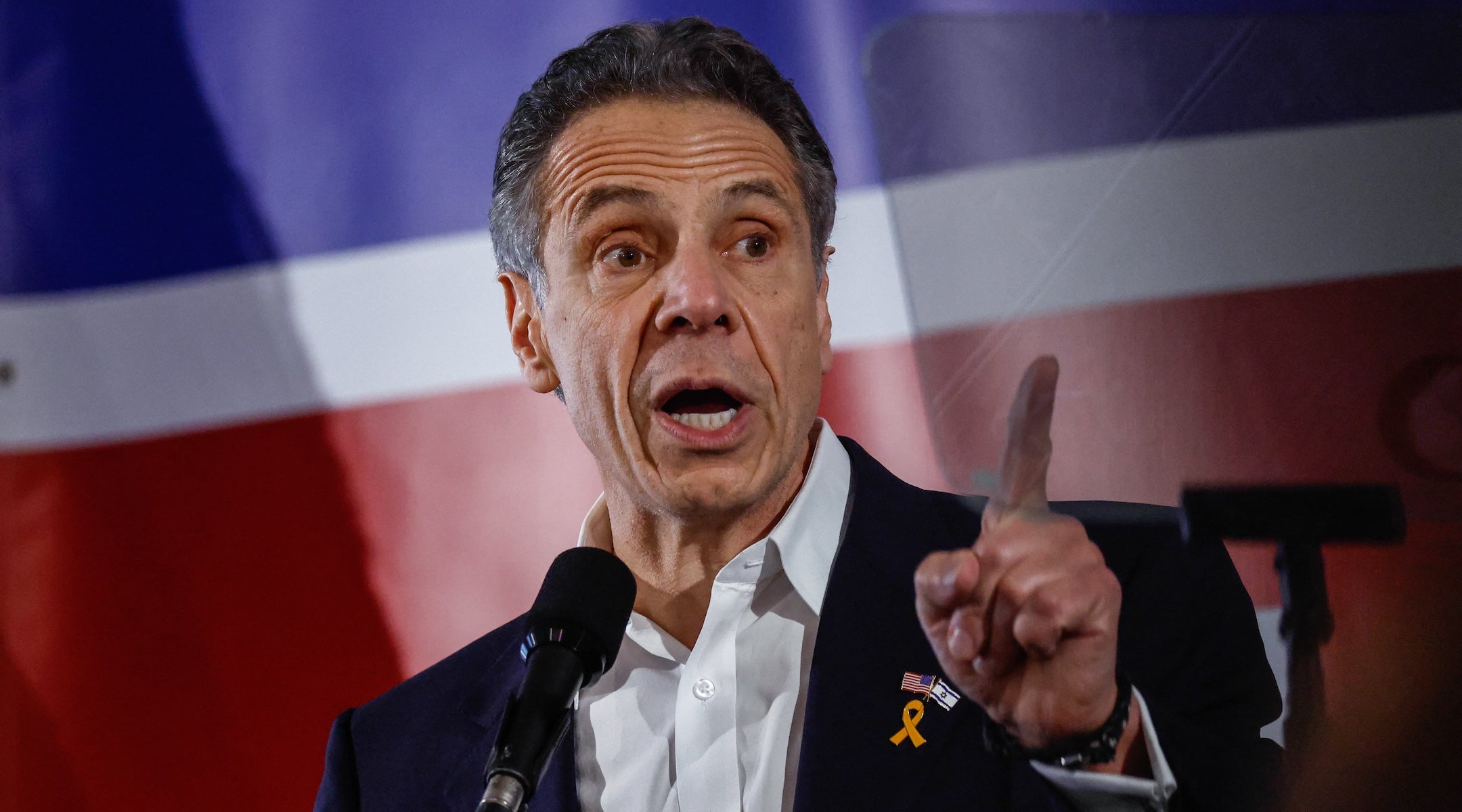
(Kena Betancur / AFP via Getty Images)
Tackling antisemitism
Cuomo has long touted deep ties to Jewish New Yorkers. In a 2002 interview with New York Jewish Week, he described being “raised in a community in Queens with Jewish people,” and he often references his Jewish in-laws.
While he was governor from 2011 to 2021, New York saw a string of attacks on Jews. In 2019 alone, those included assaults on Orthodox Jews in Brooklyn, the stabbing of five people at a rabbi’s house in Monsey, and a shooting that killed four people at a kosher supermarket just over the border in Jersey City.
Cuomo responded with several public measures. He formed a hate crimes unit in the state police, allocated $45 million to protect religious-based institutions and upped policing in Jewish neighborhoods. In 2020, he passed a law that made New York the first state to define “hate-fueled” murder as domestic terrorism, punishable by up to life in prison without parole.
During his mayoral bid, Cuomo has honed in on fighting antisemitism, often in the same breath as calling himself a stalwart supporter of Israel and a pillar against pro-Palestinian activism. He warned the crowd at the West Side Institutional Synagogue, “The forces of antisemitism and pro-Palestinian policies are organized, well funded and mobilized, and have significant political strength, even right here in the city of New York.”
At the center of Cuomo’s pitch to Jewish voters is the alternative of Mamdani, whom he has accused of “fueling antisemitism.” Mamdani says that Israel is committing genocide in Gaza and supports a boycott against Israel. Cuomo says his opponent’s positions have contributed to a breeding ground for hatred and violence against Jews, while also acknowledging that Mamdani has many younger, pro-Palestinian Jewish supporters.
A long relationship with Israel
For decades, Cuomo has emphasized his “hyper aggressive” support for Israel. He visited during the 2014 Gaza War, touring a tunnel that Israel said was built by Hamas and expressing “total solidarity” with Israel.
In 2016, he passed a controversial order that banned state agencies from investing in companies and organizations that promoted or engaged in the Boycott, Divestment and Sanctions movement against Israel. The order also required the state to create a public list of businesses aligned with BDS.
“If you boycott against Israel, New York will boycott you,” Cuomo said at the time. “If you divert revenues from Israel, New York will divert revenues from you. If you sanction Israel, New York will sanction you.”
The measure was praised by pro-Israel groups, who hold that BDS seeks to harm or destroy Israel. Critics, including the New York Civil Liberties Union, said the order infringed on First Amendment rights because boycotts are a form of free speech. Some activists also compared the public list of companies with McCarthyism. Jewish Voice for Peace, which supports BDS, protested outside Cuomo’s office.
In November 2024, Cuomo volunteered to join Israeli Prime Minister Benjamin Netanyahu’s legal defense against a warrant issued by the International Criminal Court, which charged him with war crimes and crimes against humanity in Gaza. Cuomo said at the time, “This is the moment that true friends stand up, shoulder to shoulder and fight for the State of Israel.” But by August, Cuomo said he had not been involved in defending Netanyahu since his mayoral campaign began.
During the mayoral primary, Cuomo criticized progressive candidates beyond Mamdani for their stances on Israel — including Brad Lander, the Jewish city comptroller and Netanyahu critic who cross-endorsed Mamdani. Cuomo accused Lander and City Council speaker Adrienne Adams of “aiding and supporting the most aggressive anti-Israel policies.”
Lander responded furiously at the West Side Institutional Synagogue, the same congregation where Cuomo spoke. “Somehow, we Jews have become political pawns,” said Lander. “See something or someone you don’t like? Call it antisemitism, in a cheap, craven attempt to lure in Jewish support.”
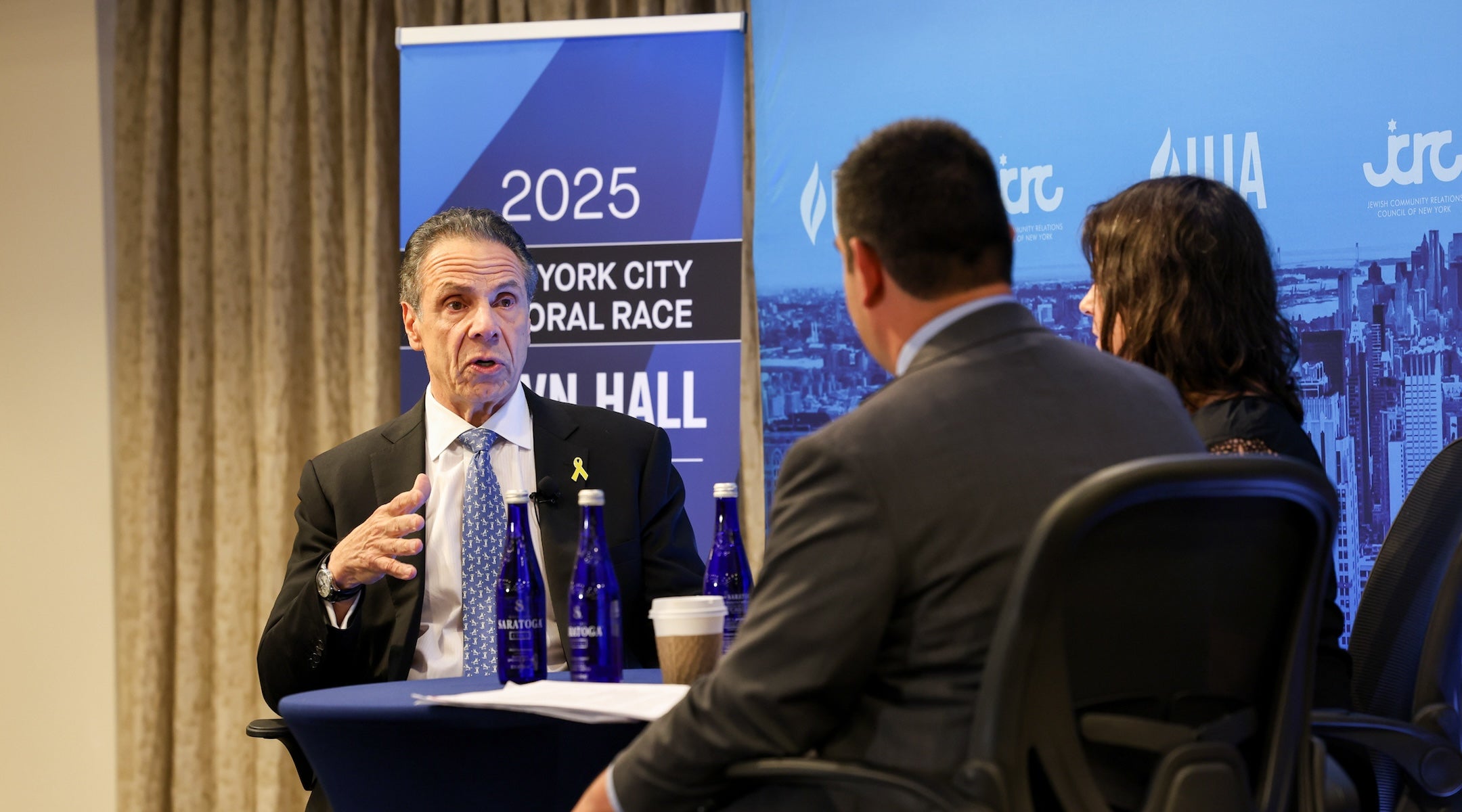
Andrew Cuomo speaks at the town hall hosted by UJA-Federation of New York and the Jewish Community Relations Council, in Midtown Manhattan, May 22, 2025. (Michael Priest Photography)
Clashing with Jews
Cuomo cultivated strong ties with Jewish leaders while he was governor, but some of those relationships hit rocky periods.
During the COVID-19 pandemic in 2020, Cuomo restricted gatherings and closed schools in Orthodox Jewish neighborhoods. He singled the community out for spreading infections “because of their religious practices” during a press conference, setting off street demonstrations among Orthodox Jews in Brooklyn.
In response to the order limiting religious gatherings, Agudath Israel of America, which represents Haredi Orthodox Jews, filed a federal lawsuit claiming their civil and religious liberties were violated. Agdath won the suit in a 5-4 ruling by the U.S. Supreme Court.
Cuomo also came under fire for allegedly disparaging an event celebrating Sukkot, when Jews gather under temporary huts often covered in tree branches, during his campaign for attorney general in 2006. He commented to his team, “These people and their f***ing tree houses,” according to The New York Times Magazine. His spokesperson denied the incident.
His friendship with Jews was also deeply tested by the sexual misconduct probe that toppled his governorship in 2021. A slew of Jewish Democrats called for his resignation, including party leaders like Sen. Chuck Schumer and Rep. Jerry Nadler. So did several liberal and progressive Jewish groups, such as the New York Jewish Agenda and Jews For Racial & Economic Justice.
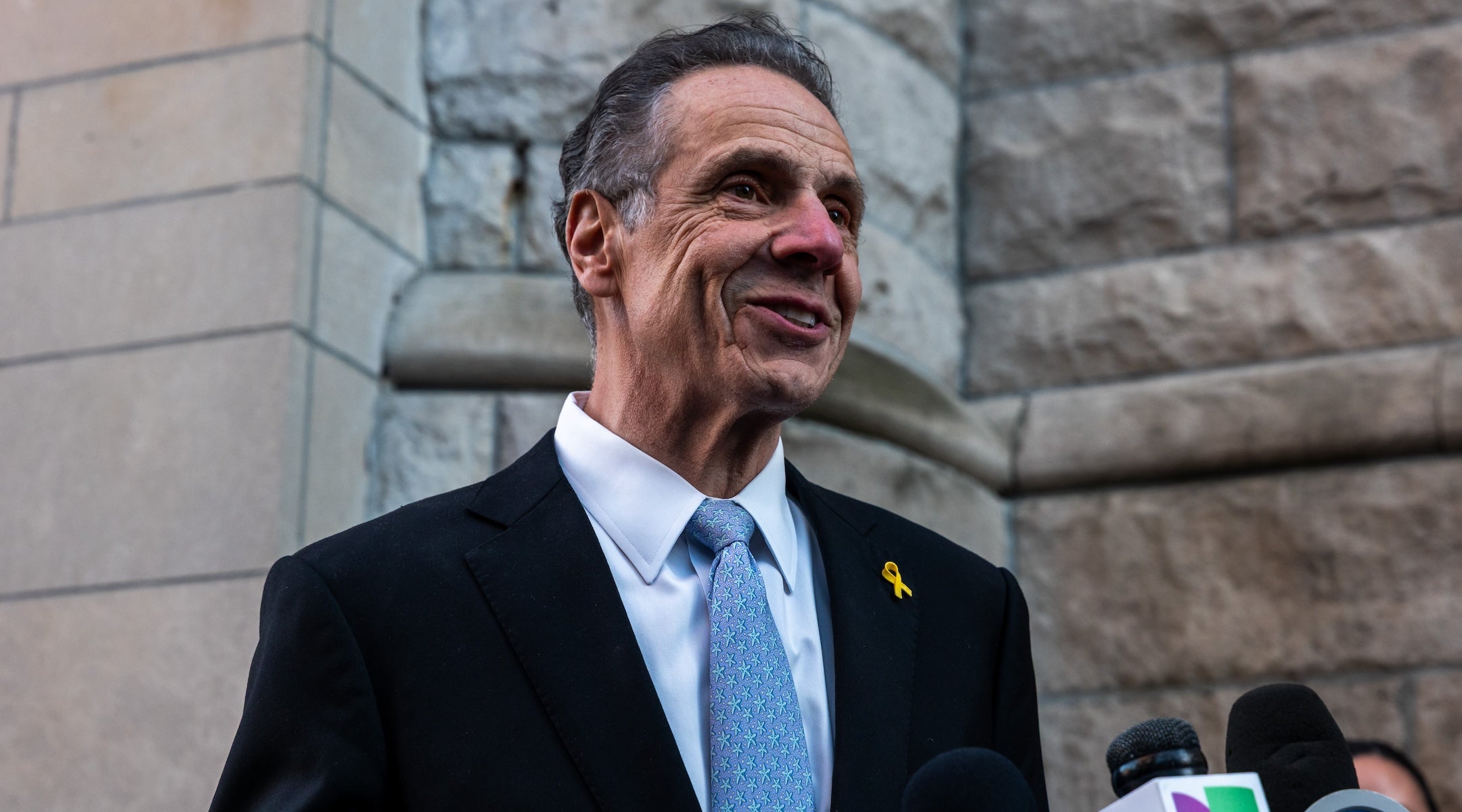
Andrew Cuomo speaks outside the West Side Institutional Synagogue, April 1, 2025, New York City. (Spencer Platt/Getty Images)
The Gaza war
Cuomo’s identification as one of Israel’s fiercest defenders has been complicated by the country’s increasingly unpopular war in Gaza.
Despite maintaining in September that he is “100% pro-Israel” and “the most aggressive governor in the country on behalf of Israel,” Cuomo now supplements his condemnations of Hamas with a call to end to the war that he indirectly acknowledges has devastated Gaza. His choice of words, referencing “the carnage every night on TV” and “horrific” violence, could be interpreted as sympathetic to the deaths of more than 66,000 Palestinians — though he never directly names them.
Cuomo has also placed more distance between himself and Netanyahu, whom he once sought to represent in court. “I never stood with Bibi,” he told The New York Times in September, saying that his legal argument was about the ICC’s jurisdiction and he had no alliance with the Israeli leader.
His shift in tone could reflect declining public opinion of Israel in the United States. Across the electorate, Quinnipiac polling shows an all-time low for sympathies with Israelis and an all-time high for sympathies with Palestinians. In New York City, a Times/Siena poll found that voters preferred Mamdani’s stance on the Israeli-Palestinian conflict over any other candidate’s by a wide margin.
Still, Cuomo has not explicitly criticized Israel’s conduct. After appearing to say in August that he did not support “what the Israel government is doing vis-à-vis Gaza” and “Israel impeding humanitarian aid,” he quickly backed off. He was simply “airing what some people feel,” not giving his own personal opinion, he clarified to The New York Times.
In a recent interview with The Forward, Cuomo said his position on Israel “hasn’t shifted one iota.”
“We want three things: We want killing to stop, because it’s a matter of humanity. We want the hostages returned, and Hamas eliminated,” he said. “If you don’t eliminate Hamas, you accomplish nothing. This will happen again and again.” That, he added, was “the same thing that Israel wants.”
JTA has documented Jewish history in real-time for over a century. Keep our journalism strong by joining us in supporting independent, award-winning reporting.
